Deck 1: Graphs, Functions, and Models
Question
Question
Question
Question
Question
Question
Question
Question
Question
Question
Question
Question
Question
Question
Question
Question
Question
Question
Question
Question
Question
Question
Question
Question
Question
Question
Question
Question
Question
Question
Question
Question
Question
Question
Question
Question
Question
Question
Question
Question
Question
Question
Question
Question
Question
Question
Question
Question
Question
Question
Question
Question
Question
Question
Question
Question
Question
Question
Question
Question
Question
Question
Question
Question
Question
Question
Question
Question
Question
Question
Question
Question
Question
Question
Question
Question
Question
Question
Question
Question

Unlock Deck
Sign up to unlock the cards in this deck!
Unlock Deck
Unlock Deck
1/189
Play
Full screen (f)
Deck 1: Graphs, Functions, and Models
1
Find the domain and range of the function represented in the graph.
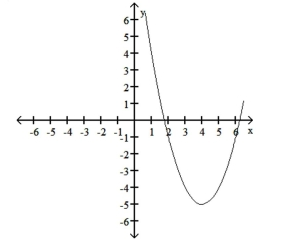
A)Domain: (-∞,∞); Range:[-5,∞)
B)Domain: (-∞,∞); Range: (-∞,∞)
C)Domain:[4,∞); Range:[-5,∞)
D)Domain: (-∞,4) or (4,∞); Range: (-∞,-5) or (-5,∞)

A)Domain: (-∞,∞); Range:[-5,∞)
B)Domain: (-∞,∞); Range: (-∞,∞)
C)Domain:[4,∞); Range:[-5,∞)
D)Domain: (-∞,4) or (4,∞); Range: (-∞,-5) or (-5,∞)
Domain: (-∞,∞); Range:[-5,∞)
2
Graph the function.
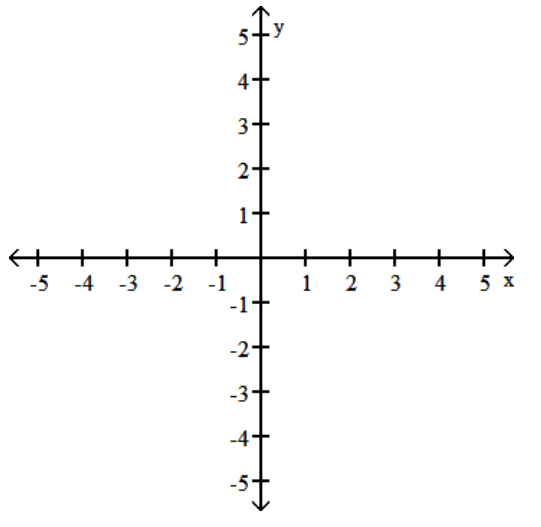
A)
B)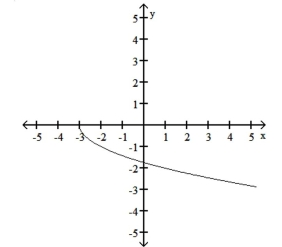
C)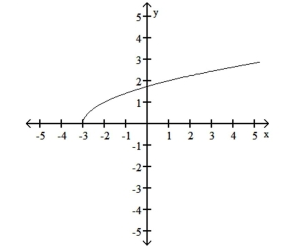
D)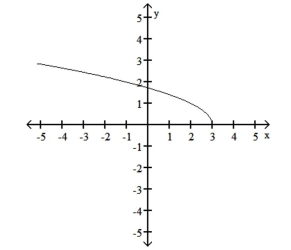

A)

B)

C)

D)

C
3
Use the distance formula and the Pythagorean theorem to determine whether the set of points could be vertices of a right
triangle.
(9,-4),(13,-4),(13,3)
A) Yes
B) No
triangle.
(9,-4),(13,-4),(13,3)
A) Yes
B) No
A
4
Find the domain of the function.
f(x)=-7 x+7
A)
B) all real numbers, or
C)
D)
f(x)=-7 x+7
A)
B) all real numbers, or
C)
D)

Unlock Deck
Unlock for access to all 189 flashcards in this deck.
Unlock Deck
k this deck
5
Graph the equation.
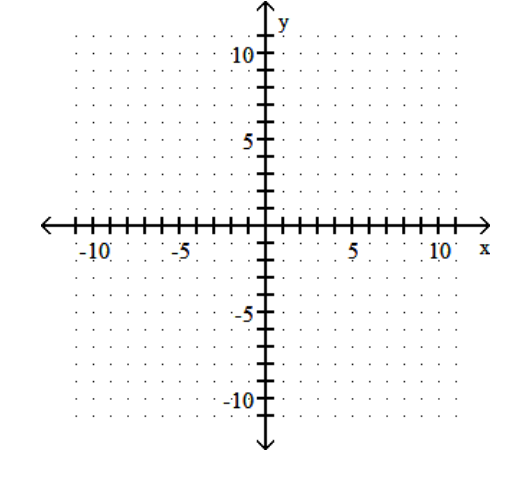
A)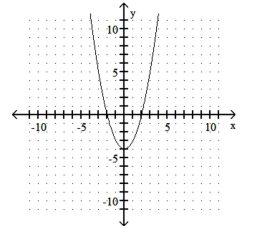
B)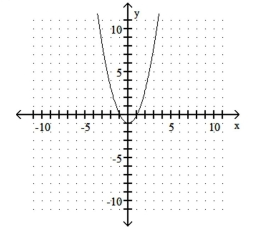
C)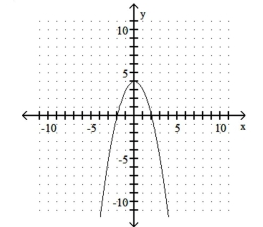
D)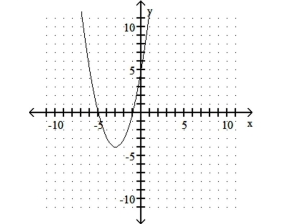

A)

B)

C)

D)


Unlock Deck
Unlock for access to all 189 flashcards in this deck.
Unlock Deck
k this deck
6
Tell whether or not the relation is a function.
{(-3,9), (-1,4), (2,-6), (6,-9)}
A) Yes
B) No
{(-3,9), (-1,4), (2,-6), (6,-9)}
A) Yes
B) No

Unlock Deck
Unlock for access to all 189 flashcards in this deck.
Unlock Deck
k this deck
7
Solve the problem.
Marty's Tee Shirt & Jacket Company is to produce a new line of jackets with an embroidery of a Great Pyrenees dog on the front. There are fixed costs of $670 to set up for production, and variable costs of $44 per jacket. Write an equation that can be used to determine the total cost, C(x), encountered by Marty's Company in producing x jackets.
A) C(x) = 670x + 44
B) C(x) = 670 - 44x
C) C(x) = 670 + 44x
D) C(x) = (670 + 44) x
Marty's Tee Shirt & Jacket Company is to produce a new line of jackets with an embroidery of a Great Pyrenees dog on the front. There are fixed costs of $670 to set up for production, and variable costs of $44 per jacket. Write an equation that can be used to determine the total cost, C(x), encountered by Marty's Company in producing x jackets.
A) C(x) = 670x + 44
B) C(x) = 670 - 44x
C) C(x) = 670 + 44x
D) C(x) = (670 + 44) x

Unlock Deck
Unlock for access to all 189 flashcards in this deck.
Unlock Deck
k this deck
8
Solve the problem.
The paired data below consist of the test scores of 6 randomly selected students and the number of hours they studied for the test. By using linear regression, the following function is obtained: y=67.3+1.07 x where x is number of hours studied and y is score on the test. Use this function to predict the score on the test of a student who studies 11 hours.
A) 74.1
B) 79.1
C) 83.8
D) 84.1
The paired data below consist of the test scores of 6 randomly selected students and the number of hours they studied for the test. By using linear regression, the following function is obtained: y=67.3+1.07 x where x is number of hours studied and y is score on the test. Use this function to predict the score on the test of a student who studies 11 hours.
A) 74.1
B) 79.1
C) 83.8
D) 84.1

Unlock Deck
Unlock for access to all 189 flashcards in this deck.
Unlock Deck
k this deck
9
Find the domain and range of the function represented in the graph.
![<strong>Find the domain and range of the function represented in the graph. </strong> A) Domain: [ - \pi , 2 \pi ] Range: [-3,3] B) Domain: [ 0,2 \pi ] Range: [0,3] C) Domain: [ \pi , 2 \pi ] Range: [-4,2] D) Domain: [-3,3] ; Range: [ - \pi , 2 \pi ]](https://d2lvgg3v3hfg70.cloudfront.net/TB34225555/11ec83fb_6953_c3e5_8cc4_e90946b74e18_TB34225555_11.jpg)
A) Domain: Range: [-3,3]
B) Domain: Range: [0,3]
C) Domain: Range: [-4,2]
D) Domain: [-3,3] ; Range:
![<strong>Find the domain and range of the function represented in the graph. </strong> A) Domain: [ - \pi , 2 \pi ] Range: [-3,3] B) Domain: [ 0,2 \pi ] Range: [0,3] C) Domain: [ \pi , 2 \pi ] Range: [-4,2] D) Domain: [-3,3] ; Range: [ - \pi , 2 \pi ]](https://d2lvgg3v3hfg70.cloudfront.net/TB34225555/11ec83fb_6953_c3e5_8cc4_e90946b74e18_TB34225555_11.jpg)
A) Domain: Range: [-3,3]
B) Domain: Range: [0,3]
C) Domain: Range: [-4,2]
D) Domain: [-3,3] ; Range:

Unlock Deck
Unlock for access to all 189 flashcards in this deck.
Unlock Deck
k this deck
10
Solve the problem.
Find the average rate of change.
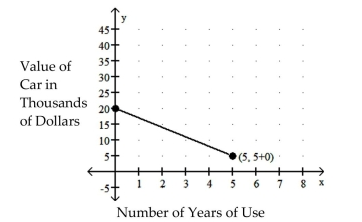
A)$4.00per year
B)-$3.00per year
C)-$4.00per year
D)$3.00per year
Find the average rate of change.

A)$4.00per year
B)-$3.00per year
C)-$4.00per year
D)$3.00per year

Unlock Deck
Unlock for access to all 189 flashcards in this deck.
Unlock Deck
k this deck
11
Solve the problem.
The function h described by gives the height of a ball thrown upward with a speed of 33.1 feet per second from a 124.26ft high window t seconds after it is thrown until it hits the ground. Find the height of the ball 1.4 seconds after it is thrown.
A) 139.24 ft
B) 201.96 ft
C) 109.28 ft
D) 46.56 ft
The function h described by gives the height of a ball thrown upward with a speed of 33.1 feet per second from a 124.26ft high window t seconds after it is thrown until it hits the ground. Find the height of the ball 1.4 seconds after it is thrown.
A) 139.24 ft
B) 201.96 ft
C) 109.28 ft
D) 46.56 ft

Unlock Deck
Unlock for access to all 189 flashcards in this deck.
Unlock Deck
k this deck
12
Determine the domain and range of the relation.
{(7,1),(8,4),(-3,3),(-3,2)}
A) Domain: {7,-3,8,-3} ; Range: {1,3,4,2}
B) Domain: {1,3,4,2} ; Range: {7,-3,8}
C) Domain: {7,-3,8} ; Range: {1,3,4,2}
D) Domain: {7,-3,8,3} ; Range: {1,3,4,2}
{(7,1),(8,4),(-3,3),(-3,2)}
A) Domain: {7,-3,8,-3} ; Range: {1,3,4,2}
B) Domain: {1,3,4,2} ; Range: {7,-3,8}
C) Domain: {7,-3,8} ; Range: {1,3,4,2}
D) Domain: {7,-3,8,3} ; Range: {1,3,4,2}

Unlock Deck
Unlock for access to all 189 flashcards in this deck.
Unlock Deck
k this deck
13
Solve the problem using your calculator.
The paired data below consist of the costs of advertising (in thousands of dollars)and the number of products sold (in thousands). Use a graphing calculator to model the data with a linear function that predicts the number of products sold as a function of the cost of advertising.
A) y=-26.4-1.42 x
B) y=26.4+1.42 x
C) y=55.8-2.79 x
D) y=55.8+2.79 x
The paired data below consist of the costs of advertising (in thousands of dollars)and the number of products sold (in thousands). Use a graphing calculator to model the data with a linear function that predicts the number of products sold as a function of the cost of advertising.
A) y=-26.4-1.42 x
B) y=26.4+1.42 x
C) y=55.8-2.79 x
D) y=55.8+2.79 x

Unlock Deck
Unlock for access to all 189 flashcards in this deck.
Unlock Deck
k this deck
14
Find the zero of the linear function.
f(x)=-4 x+5
A) -1
B) 1
C)
D)
f(x)=-4 x+5
A) -1
B) 1
C)
D)

Unlock Deck
Unlock for access to all 189 flashcards in this deck.
Unlock Deck
k this deck
15
Graph the circle using the given equation.
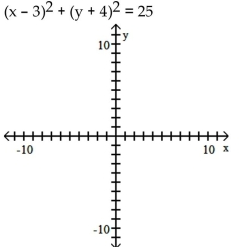
A)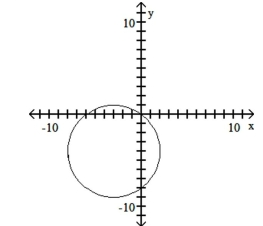
B)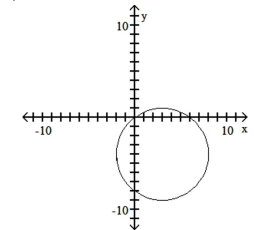
C)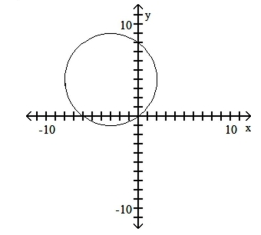
D)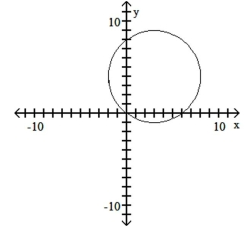

A)

B)

C)

D)


Unlock Deck
Unlock for access to all 189 flashcards in this deck.
Unlock Deck
k this deck
16
Solve the problem.
A) (0,-9) ; 4
B) (0,9) ; 4
C) (-9,0) ; 16
D) (9,0) ; 16
A) (0,-9) ; 4
B) (0,9) ; 4
C) (-9,0) ; 16
D) (9,0) ; 16

Unlock Deck
Unlock for access to all 189 flashcards in this deck.
Unlock Deck
k this deck
17
Find the zero of the linear function.
f(x)= 4 +9x
A)
B)
C)
D)
f(x)= 4 +9x
A)
B)
C)
D)

Unlock Deck
Unlock for access to all 189 flashcards in this deck.
Unlock Deck
k this deck
18
Determine whether the graph is the graph of a function.
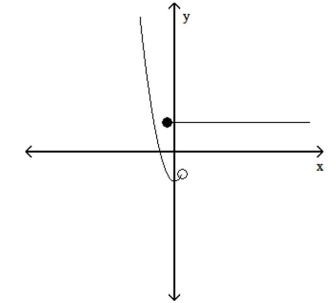
A) Yes
B) No

A) Yes
B) No

Unlock Deck
Unlock for access to all 189 flashcards in this deck.
Unlock Deck
k this deck
19
Find the equation of the circle. Express the equation in standard form
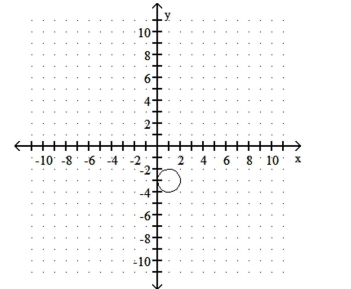
A)
B)
C)
D)

A)
B)
C)
D)

Unlock Deck
Unlock for access to all 189 flashcards in this deck.
Unlock Deck
k this deck
20
Solve the problem.
To convert a temperature from degrees Celsius to degrees Fahrenheit, you multiply the temperature in degrees Celsius by 1.8 and then add 32 to the result. Express F as a linear function of
A) F(c)= 33.8c
B)
C) F(c)=1.8c+32
D) F(c)=1.8+32c
To convert a temperature from degrees Celsius to degrees Fahrenheit, you multiply the temperature in degrees Celsius by 1.8 and then add 32 to the result. Express F as a linear function of
A) F(c)= 33.8c
B)
C) F(c)=1.8c+32
D) F(c)=1.8+32c

Unlock Deck
Unlock for access to all 189 flashcards in this deck.
Unlock Deck
k this deck
21
Find the slope of the line containing the given points.
f(8.3)= 6.5 and f(-11.6)=-7.9
A)
B)
C)
D)
f(8.3)= 6.5 and f(-11.6)=-7.9
A)
B)
C)
D)

Unlock Deck
Unlock for access to all 189 flashcards in this deck.
Unlock Deck
k this deck
22
Solve the equation.
7x-(2 x-1)=2
A)
B)
C)
D)
7x-(2 x-1)=2
A)
B)
C)
D)

Unlock Deck
Unlock for access to all 189 flashcards in this deck.
Unlock Deck
k this deck
23
Solve the problem.
Marty's Tee Shirt & Jacket Company is to produce a new line of jackets with a embroidery of a Great Pyrenees dog on the front. There are fixed costs of $680 to set up for production, and variable
Costs of $43 per jacket. Write an equation that can be used to determine the total cost, C(x),
Encountered by Marty's Company in producing x jackets, and use the equation to find the total cost
Of producing 90 jackets.
A)$4562
B)$4542
C)$4530
D)$4550
Marty's Tee Shirt & Jacket Company is to produce a new line of jackets with a embroidery of a Great Pyrenees dog on the front. There are fixed costs of $680 to set up for production, and variable
Costs of $43 per jacket. Write an equation that can be used to determine the total cost, C(x),
Encountered by Marty's Company in producing x jackets, and use the equation to find the total cost
Of producing 90 jackets.
A)$4562
B)$4542
C)$4530
D)$4550

Unlock Deck
Unlock for access to all 189 flashcards in this deck.
Unlock Deck
k this deck
24
Find the zero of the linear function.
f(x)=11-x
A) -11
B) 11
C) 1
D) -22
f(x)=11-x
A) -11
B) 11
C) 1
D) -22

Unlock Deck
Unlock for access to all 189 flashcards in this deck.
Unlock Deck
k this deck
25
Solve the equation.
3(4 x+6)=2(x+6)
A)
B)
C) -6
D) 10
3(4 x+6)=2(x+6)
A)
B)
C) -6
D) 10

Unlock Deck
Unlock for access to all 189 flashcards in this deck.
Unlock Deck
k this deck
26
Determine whether the pair of lines is parallel, perpendicular, or neither.
3x-8 y=18
32 x+12 y=18
A) Parallel
B) Perpendicular
C) Neither
3x-8 y=18
32 x+12 y=18
A) Parallel
B) Perpendicular
C) Neither

Unlock Deck
Unlock for access to all 189 flashcards in this deck.
Unlock Deck
k this deck
27
Find an equation for the circle.
Center at (0,-5) , radius 9
A)
B)
C)
D)
Center at (0,-5) , radius 9
A)
B)
C)
D)

Unlock Deck
Unlock for access to all 189 flashcards in this deck.
Unlock Deck
k this deck
28
Solve the equation.
3(4 x+1)=5-5(4 x-3)
A)
B)
C)
D) 17
3(4 x+1)=5-5(4 x-3)
A)
B)
C)
D) 17

Unlock Deck
Unlock for access to all 189 flashcards in this deck.
Unlock Deck
k this deck
29
Find the slope and the y-intercept of the line with the given equation.
5x-2y+5=0
A)
B)
C)
D)
5x-2y+5=0
A)
B)
C)
D)

Unlock Deck
Unlock for access to all 189 flashcards in this deck.
Unlock Deck
k this deck
30
Solve the problem.
The function H described by H(x) =2.75x+71.48 can be used to estimate the height, in centimeters, of a woman whose humerus (the bone from the elbow to the shoulder) is x cm long. Estimate the height of a woman whose humerus is 33.8 cm long.
A) 40.43 cm
B) 164.43 cm
C) 108.03 cm
D) 21.47 cm
The function H described by H(x) =2.75x+71.48 can be used to estimate the height, in centimeters, of a woman whose humerus (the bone from the elbow to the shoulder) is x cm long. Estimate the height of a woman whose humerus is 33.8 cm long.
A) 40.43 cm
B) 164.43 cm
C) 108.03 cm
D) 21.47 cm

Unlock Deck
Unlock for access to all 189 flashcards in this deck.
Unlock Deck
k this deck
31
Determine whether the graph is the graph of a function.
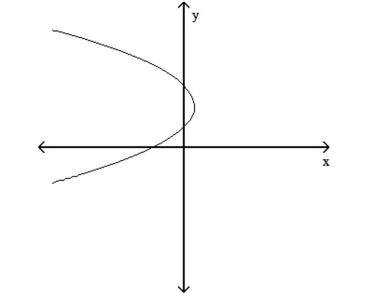
A) Yes
B) No

A) Yes
B) No

Unlock Deck
Unlock for access to all 189 flashcards in this deck.
Unlock Deck
k this deck
32
Find the slope and the y-intercept of the line with the given equation.
x=11
A) not defined; no y-intercept
B) not defined; (11,0)
C) -11 ;(-11,0)
D) -11 ;(0,0)
x=11
A) not defined; no y-intercept
B) not defined; (11,0)
C) -11 ;(-11,0)
D) -11 ;(0,0)

Unlock Deck
Unlock for access to all 189 flashcards in this deck.
Unlock Deck
k this deck
33
Solve the problem.
A car rental company charges $26 per day to rent a particular type of car and $0.16 per mile. Juan is charged $42.48 for a one-day rental. How many miles did he drive?
A)118 mi
B)103 mi
C)240 mi
D)266 mi
A car rental company charges $26 per day to rent a particular type of car and $0.16 per mile. Juan is charged $42.48 for a one-day rental. How many miles did he drive?
A)118 mi
B)103 mi
C)240 mi
D)266 mi

Unlock Deck
Unlock for access to all 189 flashcards in this deck.
Unlock Deck
k this deck
34
Graph the equation using the slope and the y-intercept.
f(x) = 3x+2
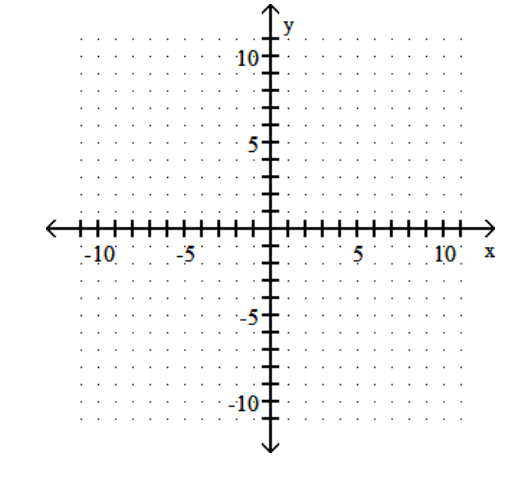
A)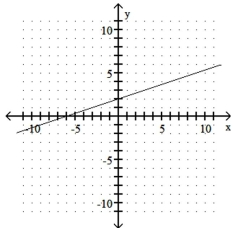
B)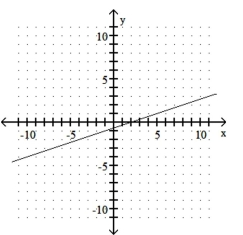
C)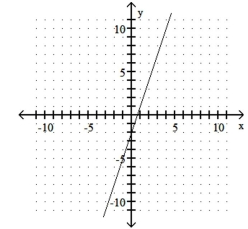
D)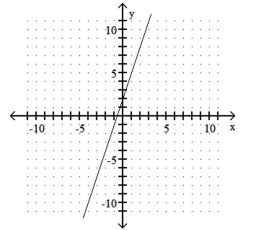
f(x) = 3x+2

A)

B)

C)

D)


Unlock Deck
Unlock for access to all 189 flashcards in this deck.
Unlock Deck
k this deck
35
Solve the problem.
Company A rents copiers for a monthly charge of $90 plus 6 cents per copy. Company B rents copiers for a monthly charge of $180 plus 3 cents per copy. What is the number of copies above
Which Company A's charges are the higher of the two?
A)6000 copies
B)3000 copies
C)1500 copies
D)3100 copies
Company A rents copiers for a monthly charge of $90 plus 6 cents per copy. Company B rents copiers for a monthly charge of $180 plus 3 cents per copy. What is the number of copies above
Which Company A's charges are the higher of the two?
A)6000 copies
B)3000 copies
C)1500 copies
D)3100 copies

Unlock Deck
Unlock for access to all 189 flashcards in this deck.
Unlock Deck
k this deck
36
Find the slope of the line.
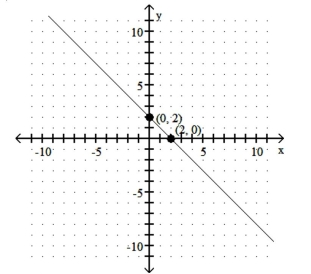
A) 1
B) -1
C) 2
D) -2

A) 1
B) -1
C) 2
D) -2

Unlock Deck
Unlock for access to all 189 flashcards in this deck.
Unlock Deck
k this deck
37
Solve the problem.
Last year, 302 million music CDs were purchased by 112 million households in the United States. On average, how many CDs were purchased in each household?
A)151 CDs
B)2.7 CDs
C)302 CDs
D)3 CDs
Last year, 302 million music CDs were purchased by 112 million households in the United States. On average, how many CDs were purchased in each household?
A)151 CDs
B)2.7 CDs
C)302 CDs
D)3 CDs

Unlock Deck
Unlock for access to all 189 flashcards in this deck.
Unlock Deck
k this deck
38
Solve the problem.
The information in the chart gives the salary of a person for the stated years. Model the data with a linear function using the points (1, 24,500)and (3, 26,600).
A) y=-1295 x+23,500
B) y=28.7 x+23,500
C) y=1050 x+23,500
D) y=1050x
The information in the chart gives the salary of a person for the stated years. Model the data with a linear function using the points (1, 24,500)and (3, 26,600).
A) y=-1295 x+23,500
B) y=28.7 x+23,500
C) y=1050 x+23,500
D) y=1050x

Unlock Deck
Unlock for access to all 189 flashcards in this deck.
Unlock Deck
k this deck
39
Determine the slope, if it exists, of the graph of the given linear equation.
f(x)=7+2 x
A) m=-2
B) m=-7
C) m=7
D) m=2
f(x)=7+2 x
A) m=-2
B) m=-7
C) m=7
D) m=2

Unlock Deck
Unlock for access to all 189 flashcards in this deck.
Unlock Deck
k this deck
40
Solve the problem.
A shipping company has determined that their drivers in Montana on average travel 80 miles on a single delivery route for mail order products. This is five times the distance of an average route for
Their drivers in New Jersey. How far, on average, is the route in New Jersey?
A)160 mi
B)400 mi
C)16 mi
D)80 mi
A shipping company has determined that their drivers in Montana on average travel 80 miles on a single delivery route for mail order products. This is five times the distance of an average route for
Their drivers in New Jersey. How far, on average, is the route in New Jersey?
A)160 mi
B)400 mi
C)16 mi
D)80 mi

Unlock Deck
Unlock for access to all 189 flashcards in this deck.
Unlock Deck
k this deck
41
Find the coordinates of the points shown on the graph.
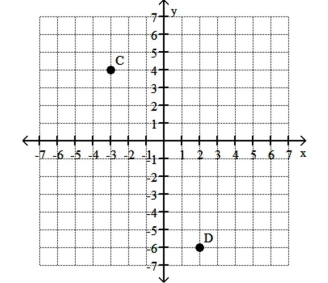
A) C: (-3,-6) , D: (4,-6)
B) C: (-3,4) , D: (-6,2)
C) C: (-3,4) , D: (2,-6)
D) C: (4,10) , D: (-6,2)

A) C: (-3,-6) , D: (4,-6)
B) C: (-3,4) , D: (-6,2)
C) C: (-3,4) , D: (2,-6)
D) C: (4,10) , D: (-6,2)

Unlock Deck
Unlock for access to all 189 flashcards in this deck.
Unlock Deck
k this deck
42
The following table contains input-output values for a function. Is this function linear?
A) Yes
B) No
A) Yes
B) No

Unlock Deck
Unlock for access to all 189 flashcards in this deck.
Unlock Deck
k this deck
43
Find the midpoint of the segment having the given endpoints.
(3,7) and (-4,8)
A)
B)
C) (-1,15)
D) (7,-1)
(3,7) and (-4,8)
A)
B)
C) (-1,15)
D) (7,-1)

Unlock Deck
Unlock for access to all 189 flashcards in this deck.
Unlock Deck
k this deck
44
Find the slope of the line.
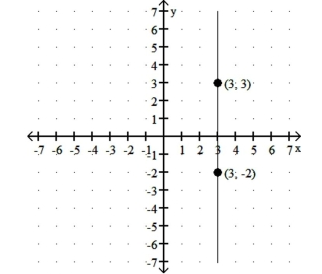
A) 0
B) -5
C) not defined
D) 5

A) 0
B) -5
C) not defined
D) 5

Unlock Deck
Unlock for access to all 189 flashcards in this deck.
Unlock Deck
k this deck
45
Solve and graph the solution set.
![<strong>Solve and graph the solution set. - 5 x + 10 \leq - 6 x - 2 </strong> A) \{ x \mid x \leq - 12 \} \text { or } ( - \infty , - 12 ] B) \{ x \mid x > - 5 \} \text { or } ( - 5 , \infty ) C) \{ x \mid x < - 5 \} \text { or } ( - \infty , - 5 ) D) \{ x \mid x \geq - 12 \} \text { or } [ - 12 , \infty )](https://d2lvgg3v3hfg70.cloudfront.net/TB2705/11ecbb00_d966_7faf_8bc5_07bc11ed4c6b_TB2705_11.jpg)
A)
![<strong>Solve and graph the solution set. - 5 x + 10 \leq - 6 x - 2 </strong> A) \{ x \mid x \leq - 12 \} \text { or } ( - \infty , - 12 ] B) \{ x \mid x > - 5 \} \text { or } ( - 5 , \infty ) C) \{ x \mid x < - 5 \} \text { or } ( - \infty , - 5 ) D) \{ x \mid x \geq - 12 \} \text { or } [ - 12 , \infty )](https://d2lvgg3v3hfg70.cloudfront.net/TB2705/11ecbb00_ddfb_9830_8bc5_97659ecb76ca_TB2705_11.jpg)
B)
![<strong>Solve and graph the solution set. - 5 x + 10 \leq - 6 x - 2 </strong> A) \{ x \mid x \leq - 12 \} \text { or } ( - \infty , - 12 ] B) \{ x \mid x > - 5 \} \text { or } ( - 5 , \infty ) C) \{ x \mid x < - 5 \} \text { or } ( - \infty , - 5 ) D) \{ x \mid x \geq - 12 \} \text { or } [ - 12 , \infty )](https://d2lvgg3v3hfg70.cloudfront.net/TB2705/11ecbb00_e268_6831_8bc5_09f115acefd8_TB2705_11.jpg)
C)
![<strong>Solve and graph the solution set. - 5 x + 10 \leq - 6 x - 2 </strong> A) \{ x \mid x \leq - 12 \} \text { or } ( - \infty , - 12 ] B) \{ x \mid x > - 5 \} \text { or } ( - 5 , \infty ) C) \{ x \mid x < - 5 \} \text { or } ( - \infty , - 5 ) D) \{ x \mid x \geq - 12 \} \text { or } [ - 12 , \infty )](https://d2lvgg3v3hfg70.cloudfront.net/TB2705/11ecbb00_e71b_41e2_8bc5_354b31c9261b_TB2705_11.jpg)
D)
![<strong>Solve and graph the solution set. - 5 x + 10 \leq - 6 x - 2 </strong> A) \{ x \mid x \leq - 12 \} \text { or } ( - \infty , - 12 ] B) \{ x \mid x > - 5 \} \text { or } ( - 5 , \infty ) C) \{ x \mid x < - 5 \} \text { or } ( - \infty , - 5 ) D) \{ x \mid x \geq - 12 \} \text { or } [ - 12 , \infty )](https://d2lvgg3v3hfg70.cloudfront.net/TB2705/11ecbb00_ebe4_89c3_8bc5_6b6f098017a1_TB2705_11.jpg)
![<strong>Solve and graph the solution set. - 5 x + 10 \leq - 6 x - 2 </strong> A) \{ x \mid x \leq - 12 \} \text { or } ( - \infty , - 12 ] B) \{ x \mid x > - 5 \} \text { or } ( - 5 , \infty ) C) \{ x \mid x < - 5 \} \text { or } ( - \infty , - 5 ) D) \{ x \mid x \geq - 12 \} \text { or } [ - 12 , \infty )](https://d2lvgg3v3hfg70.cloudfront.net/TB2705/11ecbb00_d966_7faf_8bc5_07bc11ed4c6b_TB2705_11.jpg)
A)
![<strong>Solve and graph the solution set. - 5 x + 10 \leq - 6 x - 2 </strong> A) \{ x \mid x \leq - 12 \} \text { or } ( - \infty , - 12 ] B) \{ x \mid x > - 5 \} \text { or } ( - 5 , \infty ) C) \{ x \mid x < - 5 \} \text { or } ( - \infty , - 5 ) D) \{ x \mid x \geq - 12 \} \text { or } [ - 12 , \infty )](https://d2lvgg3v3hfg70.cloudfront.net/TB2705/11ecbb00_ddfb_9830_8bc5_97659ecb76ca_TB2705_11.jpg)
B)
![<strong>Solve and graph the solution set. - 5 x + 10 \leq - 6 x - 2 </strong> A) \{ x \mid x \leq - 12 \} \text { or } ( - \infty , - 12 ] B) \{ x \mid x > - 5 \} \text { or } ( - 5 , \infty ) C) \{ x \mid x < - 5 \} \text { or } ( - \infty , - 5 ) D) \{ x \mid x \geq - 12 \} \text { or } [ - 12 , \infty )](https://d2lvgg3v3hfg70.cloudfront.net/TB2705/11ecbb00_e268_6831_8bc5_09f115acefd8_TB2705_11.jpg)
C)
![<strong>Solve and graph the solution set. - 5 x + 10 \leq - 6 x - 2 </strong> A) \{ x \mid x \leq - 12 \} \text { or } ( - \infty , - 12 ] B) \{ x \mid x > - 5 \} \text { or } ( - 5 , \infty ) C) \{ x \mid x < - 5 \} \text { or } ( - \infty , - 5 ) D) \{ x \mid x \geq - 12 \} \text { or } [ - 12 , \infty )](https://d2lvgg3v3hfg70.cloudfront.net/TB2705/11ecbb00_e71b_41e2_8bc5_354b31c9261b_TB2705_11.jpg)
D)
![<strong>Solve and graph the solution set. - 5 x + 10 \leq - 6 x - 2 </strong> A) \{ x \mid x \leq - 12 \} \text { or } ( - \infty , - 12 ] B) \{ x \mid x > - 5 \} \text { or } ( - 5 , \infty ) C) \{ x \mid x < - 5 \} \text { or } ( - \infty , - 5 ) D) \{ x \mid x \geq - 12 \} \text { or } [ - 12 , \infty )](https://d2lvgg3v3hfg70.cloudfront.net/TB2705/11ecbb00_ebe4_89c3_8bc5_6b6f098017a1_TB2705_11.jpg)

Unlock Deck
Unlock for access to all 189 flashcards in this deck.
Unlock Deck
k this deck
46
Write equations of the horizontal and the vertical lines that pass through the given point.
A) horizontal: vertical: x=-4
B) horizontal: y=-4 ; vertical:
C) horizontal: vertical: x=-4 y
D) horizontal: vertical: x=-4
A) horizontal: vertical: x=-4
B) horizontal: y=-4 ; vertical:
C) horizontal: vertical: x=-4 y
D) horizontal: vertical: x=-4

Unlock Deck
Unlock for access to all 189 flashcards in this deck.
Unlock Deck
k this deck
47
Find the slope of the line containing the given points.
(-1,7) and (-1,-9)
A) 0
B) -8
C) 1
D) not defined
(-1,7) and (-1,-9)
A) 0
B) -8
C) 1
D) not defined

Unlock Deck
Unlock for access to all 189 flashcards in this deck.
Unlock Deck
k this deck
48
Find the slope and the y-intercept of the line with the given equation.
f(x)=-1.5+x
A) 1; (0,-1.5)
B) 1; (0,1.5)
C) -1; (0,-1.5)
D) 1 ; (-1.5,0)
f(x)=-1.5+x
A) 1; (0,-1.5)
B) 1; (0,1.5)
C) -1; (0,-1.5)
D) 1 ; (-1.5,0)

Unlock Deck
Unlock for access to all 189 flashcards in this deck.
Unlock Deck
k this deck
49
Solve the problem.
The cost for labor associated with fixing a washing machine is computed as follows: There is a fixed charge of $35 for the repairman to come to the house, to which a charge of $22 per hour is added. Find an equation that can be used to determine the labor cost, C(x), of a repair that takes x hours.
A) C(x) = (35 + 22) x
B) C(x) = 35 - 22x
C) C(x) = 22 + 35x
D) C(x) = 35 + 22x
The cost for labor associated with fixing a washing machine is computed as follows: There is a fixed charge of $35 for the repairman to come to the house, to which a charge of $22 per hour is added. Find an equation that can be used to determine the labor cost, C(x), of a repair that takes x hours.
A) C(x) = (35 + 22) x
B) C(x) = 35 - 22x
C) C(x) = 22 + 35x
D) C(x) = 35 + 22x

Unlock Deck
Unlock for access to all 189 flashcards in this deck.
Unlock Deck
k this deck
50
Plot the two points given by the ordered pairs.
A(-4, -4), B(-6, 2)
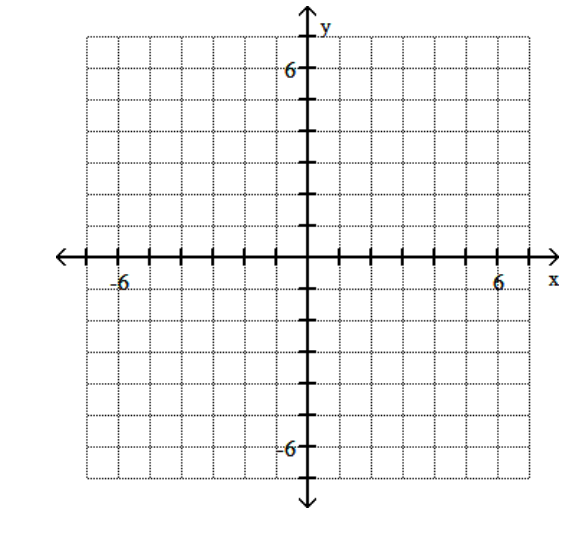
A)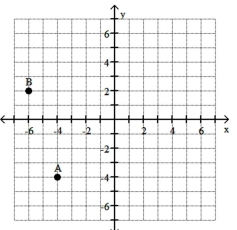
B)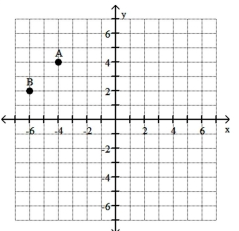
C)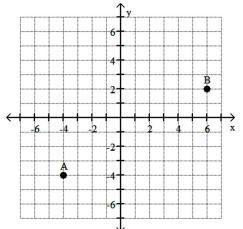
D)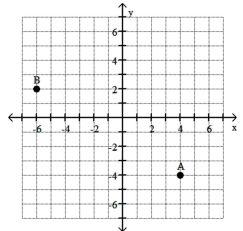
A(-4, -4), B(-6, 2)

A)

B)

C)

D)


Unlock Deck
Unlock for access to all 189 flashcards in this deck.
Unlock Deck
k this deck
51
Find the intercepts and then graph the line.
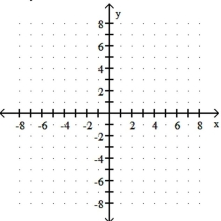
A) x-intercept: (3, 0); y-intercept: (0, -6)
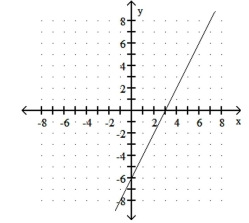
B) x-intercept: (-3, 0); y-intercept: (0, 6)
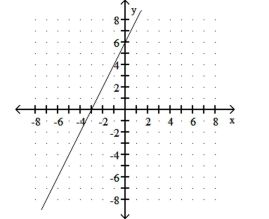
C) x-intercept: (3, 0); y-intercept: (0, 6)
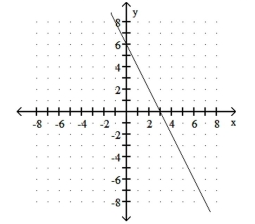
D) x-intercept: (-3, 0); y-intercept: (0, -6)
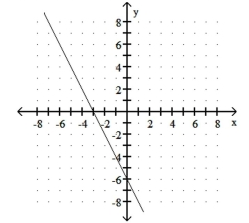

A) x-intercept: (3, 0); y-intercept: (0, -6)

B) x-intercept: (-3, 0); y-intercept: (0, 6)

C) x-intercept: (3, 0); y-intercept: (0, 6)

D) x-intercept: (-3, 0); y-intercept: (0, -6)


Unlock Deck
Unlock for access to all 189 flashcards in this deck.
Unlock Deck
k this deck
52
Solve the equation.
A)
В)
C)
D)
A)
В)
C)
D)

Unlock Deck
Unlock for access to all 189 flashcards in this deck.
Unlock Deck
k this deck
53
Find the zero of the linear function.
f(x)= 22-x
A) 22
B)
C)-22
D) 0
f(x)= 22-x
A) 22
B)
C)-22
D) 0

Unlock Deck
Unlock for access to all 189 flashcards in this deck.
Unlock Deck
k this deck
54
Find the domain and range of the function represented in the graph.
![<strong>Find the domain and range of the function represented in the graph. </strong> A) Domain: [-5,0] ; Range: [0,5) B) Domain: [0,5] ; Range: [0,5] C) Domain: (0,5] ; Range: ( - 5 , \infty ) D) Domain: (0,5) ; Range: (0,5)](https://d2lvgg3v3hfg70.cloudfront.net/TB34225555/11ec8401_5a5d_727b_8cc4_cf69ec6ab982_TB34225555_11.jpg)
A) Domain: [-5,0] ; Range: [0,5)
B) Domain: [0,5] ; Range: [0,5]
C) Domain: (0,5] ; Range:
D) Domain: (0,5) ; Range: (0,5)
![<strong>Find the domain and range of the function represented in the graph. </strong> A) Domain: [-5,0] ; Range: [0,5) B) Domain: [0,5] ; Range: [0,5] C) Domain: (0,5] ; Range: ( - 5 , \infty ) D) Domain: (0,5) ; Range: (0,5)](https://d2lvgg3v3hfg70.cloudfront.net/TB34225555/11ec8401_5a5d_727b_8cc4_cf69ec6ab982_TB34225555_11.jpg)
A) Domain: [-5,0] ; Range: [0,5)
B) Domain: [0,5] ; Range: [0,5]
C) Domain: (0,5] ; Range:
D) Domain: (0,5) ; Range: (0,5)

Unlock Deck
Unlock for access to all 189 flashcards in this deck.
Unlock Deck
k this deck
55
Solve the problem using your calculator.
Two separate tests are designed to measure a student's ability to solve problems. Several students are randomly selected to take both tests and the results are shown below. Use a graphing calculator to model the data with a linear function that predicts a student's score on Test B as a function of his or her score on Test A.
A) y=-19.4-0.930x
B) y=19.4+0.930x
C) y=-0.930+19.4x
D) y=0.930-19.4x
Two separate tests are designed to measure a student's ability to solve problems. Several students are randomly selected to take both tests and the results are shown below. Use a graphing calculator to model the data with a linear function that predicts a student's score on Test B as a function of his or her score on Test A.
A) y=-19.4-0.930x
B) y=19.4+0.930x
C) y=-0.930+19.4x
D) y=0.930-19.4x

Unlock Deck
Unlock for access to all 189 flashcards in this deck.
Unlock Deck
k this deck
56
Find the midpoint of the segment having the given endpoints.
(4,0) and (8,6)
A) (6,3)
B) (-4,-6)
C) (12,6)
D) (-2,-3)
(4,0) and (8,6)
A) (6,3)
B) (-4,-6)
C) (12,6)
D) (-2,-3)

Unlock Deck
Unlock for access to all 189 flashcards in this deck.
Unlock Deck
k this deck
57
Solve and write interval notation for the solution set. Then graph the solution set.
![<strong>Solve and write interval notation for the solution set. Then graph the solution set. - 3 \leq \frac { 1 } { 4 } ( 3 x - 1 ) < 4 </strong> A) \left[ - \frac { 11 } { 3 } , \frac { 17 } { 3 } \right] B) \left( - \frac { 13 } { 3 } , 5 \right] C) \left[ - \frac { 13 } { 3 } , 5 \right) D) \left( - \frac { 11 } { 3 } , \frac { 17 } { 3 } \right]](https://d2lvgg3v3hfg70.cloudfront.net/TB2705/11ecbb00_b6c9_431a_8bc5_39c0e0119a4b_TB2705_11.jpg)
A)
![<strong>Solve and write interval notation for the solution set. Then graph the solution set. - 3 \leq \frac { 1 } { 4 } ( 3 x - 1 ) < 4 </strong> A) \left[ - \frac { 11 } { 3 } , \frac { 17 } { 3 } \right] B) \left( - \frac { 13 } { 3 } , 5 \right] C) \left[ - \frac { 13 } { 3 } , 5 \right) D) \left( - \frac { 11 } { 3 } , \frac { 17 } { 3 } \right]](https://d2lvgg3v3hfg70.cloudfront.net/TB2705/11ecbb00_bea4_5edb_8bc5_1d0f7a176a55_TB2705_00.jpg)
B)
![<strong>Solve and write interval notation for the solution set. Then graph the solution set. - 3 \leq \frac { 1 } { 4 } ( 3 x - 1 ) < 4 </strong> A) \left[ - \frac { 11 } { 3 } , \frac { 17 } { 3 } \right] B) \left( - \frac { 13 } { 3 } , 5 \right] C) \left[ - \frac { 13 } { 3 } , 5 \right) D) \left( - \frac { 11 } { 3 } , \frac { 17 } { 3 } \right]](https://d2lvgg3v3hfg70.cloudfront.net/TB2705/11ecbb00_c46e_26cc_8bc5_f95d3bfe1774_TB2705_11.jpg)
C)
![<strong>Solve and write interval notation for the solution set. Then graph the solution set. - 3 \leq \frac { 1 } { 4 } ( 3 x - 1 ) < 4 </strong> A) \left[ - \frac { 11 } { 3 } , \frac { 17 } { 3 } \right] B) \left( - \frac { 13 } { 3 } , 5 \right] C) \left[ - \frac { 13 } { 3 } , 5 \right) D) \left( - \frac { 11 } { 3 } , \frac { 17 } { 3 } \right]](https://d2lvgg3v3hfg70.cloudfront.net/TB2705/11ecbb00_c8c1_062d_8bc5_3d8a99361829_TB2705_11.jpg)
D)
![<strong>Solve and write interval notation for the solution set. Then graph the solution set. - 3 \leq \frac { 1 } { 4 } ( 3 x - 1 ) < 4 </strong> A) \left[ - \frac { 11 } { 3 } , \frac { 17 } { 3 } \right] B) \left( - \frac { 13 } { 3 } , 5 \right] C) \left[ - \frac { 13 } { 3 } , 5 \right) D) \left( - \frac { 11 } { 3 } , \frac { 17 } { 3 } \right]](https://d2lvgg3v3hfg70.cloudfront.net/TB2705/11ecbb00_ccf7_5cde_8bc5_a95a0b8426ff_TB2705_11.jpg)
![<strong>Solve and write interval notation for the solution set. Then graph the solution set. - 3 \leq \frac { 1 } { 4 } ( 3 x - 1 ) < 4 </strong> A) \left[ - \frac { 11 } { 3 } , \frac { 17 } { 3 } \right] B) \left( - \frac { 13 } { 3 } , 5 \right] C) \left[ - \frac { 13 } { 3 } , 5 \right) D) \left( - \frac { 11 } { 3 } , \frac { 17 } { 3 } \right]](https://d2lvgg3v3hfg70.cloudfront.net/TB2705/11ecbb00_b6c9_431a_8bc5_39c0e0119a4b_TB2705_11.jpg)
A)
![<strong>Solve and write interval notation for the solution set. Then graph the solution set. - 3 \leq \frac { 1 } { 4 } ( 3 x - 1 ) < 4 </strong> A) \left[ - \frac { 11 } { 3 } , \frac { 17 } { 3 } \right] B) \left( - \frac { 13 } { 3 } , 5 \right] C) \left[ - \frac { 13 } { 3 } , 5 \right) D) \left( - \frac { 11 } { 3 } , \frac { 17 } { 3 } \right]](https://d2lvgg3v3hfg70.cloudfront.net/TB2705/11ecbb00_bea4_5edb_8bc5_1d0f7a176a55_TB2705_00.jpg)
B)
![<strong>Solve and write interval notation for the solution set. Then graph the solution set. - 3 \leq \frac { 1 } { 4 } ( 3 x - 1 ) < 4 </strong> A) \left[ - \frac { 11 } { 3 } , \frac { 17 } { 3 } \right] B) \left( - \frac { 13 } { 3 } , 5 \right] C) \left[ - \frac { 13 } { 3 } , 5 \right) D) \left( - \frac { 11 } { 3 } , \frac { 17 } { 3 } \right]](https://d2lvgg3v3hfg70.cloudfront.net/TB2705/11ecbb00_c46e_26cc_8bc5_f95d3bfe1774_TB2705_11.jpg)
C)
![<strong>Solve and write interval notation for the solution set. Then graph the solution set. - 3 \leq \frac { 1 } { 4 } ( 3 x - 1 ) < 4 </strong> A) \left[ - \frac { 11 } { 3 } , \frac { 17 } { 3 } \right] B) \left( - \frac { 13 } { 3 } , 5 \right] C) \left[ - \frac { 13 } { 3 } , 5 \right) D) \left( - \frac { 11 } { 3 } , \frac { 17 } { 3 } \right]](https://d2lvgg3v3hfg70.cloudfront.net/TB2705/11ecbb00_c8c1_062d_8bc5_3d8a99361829_TB2705_11.jpg)
D)
![<strong>Solve and write interval notation for the solution set. Then graph the solution set. - 3 \leq \frac { 1 } { 4 } ( 3 x - 1 ) < 4 </strong> A) \left[ - \frac { 11 } { 3 } , \frac { 17 } { 3 } \right] B) \left( - \frac { 13 } { 3 } , 5 \right] C) \left[ - \frac { 13 } { 3 } , 5 \right) D) \left( - \frac { 11 } { 3 } , \frac { 17 } { 3 } \right]](https://d2lvgg3v3hfg70.cloudfront.net/TB2705/11ecbb00_ccf7_5cde_8bc5_a95a0b8426ff_TB2705_11.jpg)

Unlock Deck
Unlock for access to all 189 flashcards in this deck.
Unlock Deck
k this deck
58
Find the distance between the pair of points. Give an exact answer, and where appropriate, an approximation to three
decimal places.
(-1,9) and (-7,12)
A)
B)
C)
D)
decimal places.
(-1,9) and (-7,12)
A)
B)
C)
D)

Unlock Deck
Unlock for access to all 189 flashcards in this deck.
Unlock Deck
k this deck
59
Find the domain of the function.
A)
B)
C) all real numbers, or
D)
A)
B)
C) all real numbers, or
D)

Unlock Deck
Unlock for access to all 189 flashcards in this deck.
Unlock Deck
k this deck
60
Solve the problem.
A deep sea diving bell is being lowered at a constant rate. After 12 minutes, the bell is at a depth of 500 feet. After 55 minutes the bell is at a depth of 1400 feet. What is the average rate of lowering per
Minute? Round your answer to the nearest tenth.
A)0.05 ft per min
B)25.5 ft per min
C)20.9 ft per min
D)16.4 ft per min
A deep sea diving bell is being lowered at a constant rate. After 12 minutes, the bell is at a depth of 500 feet. After 55 minutes the bell is at a depth of 1400 feet. What is the average rate of lowering per
Minute? Round your answer to the nearest tenth.
A)0.05 ft per min
B)25.5 ft per min
C)20.9 ft per min
D)16.4 ft per min

Unlock Deck
Unlock for access to all 189 flashcards in this deck.
Unlock Deck
k this deck
61
Tell whether or not the relation is a function.
{(2,-7), (2,-5), (5,1), (9,-7), (10,8)}
A)Yes
B)No
{(2,-7), (2,-5), (5,1), (9,-7), (10,8)}
A)Yes
B)No

Unlock Deck
Unlock for access to all 189 flashcards in this deck.
Unlock Deck
k this deck
62
The following table contains input-output values for a function. Is this function linear?
A) Yes
B) No
A) Yes
B) No

Unlock Deck
Unlock for access to all 189 flashcards in this deck.
Unlock Deck
k this deck
63
Plot the two points given by the ordered pairs.
A(-1, 0), B(-2, 5)
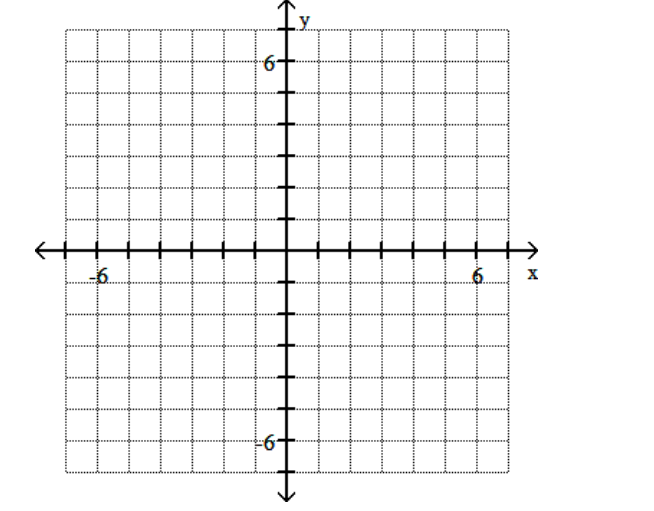
A)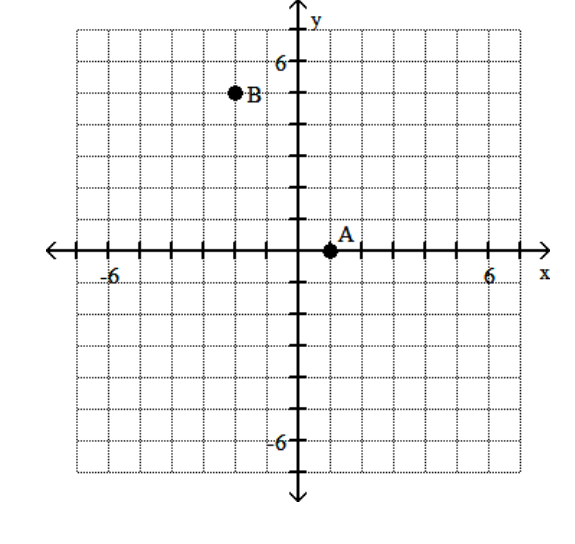
B)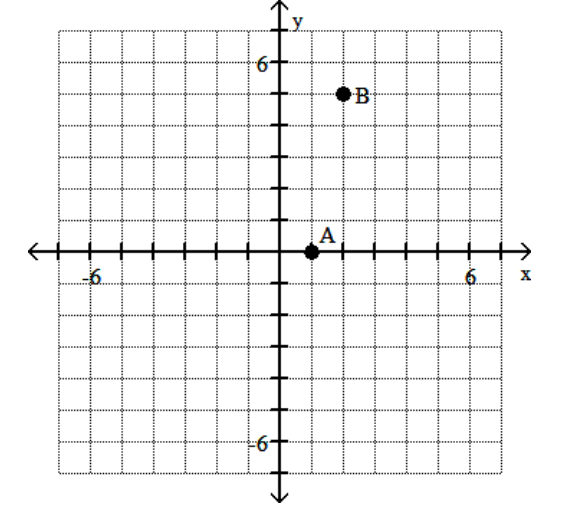
C)
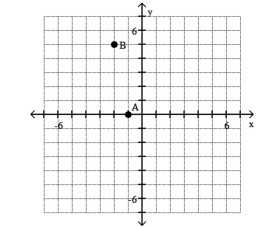
D)
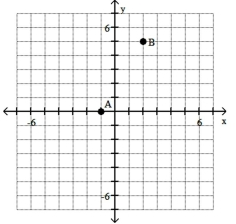
A(-1, 0), B(-2, 5)

A)

B)

C)

D)


Unlock Deck
Unlock for access to all 189 flashcards in this deck.
Unlock Deck
k this deck
64
Use the given graph to find the x-intercept and the zero of the function.
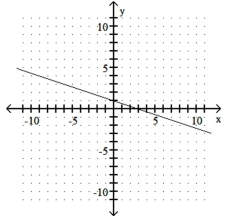
A) (1,0); 1
B) (3,0); 3
C) (0,0); 0
D) (3,1); 3

A) (1,0); 1
B) (3,0); 3
C) (0,0); 0
D) (3,1); 3

Unlock Deck
Unlock for access to all 189 flashcards in this deck.
Unlock Deck
k this deck
65
Is the following correspondence a function?

A)Yes
B)No

A)Yes
B)No

Unlock Deck
Unlock for access to all 189 flashcards in this deck.
Unlock Deck
k this deck
66
Solve the equation.
2x-5=0
A)
B)
C)
D)
2x-5=0
A)
B)
C)
D)

Unlock Deck
Unlock for access to all 189 flashcards in this deck.
Unlock Deck
k this deck
67
Solve the equation.
-3 x+9=9-3 x
A) no solution
B) 0
C) 9
D) all real numbers
-3 x+9=9-3 x
A) no solution
B) 0
C) 9
D) all real numbers

Unlock Deck
Unlock for access to all 189 flashcards in this deck.
Unlock Deck
k this deck
68
Find the equation of the circle. Express the equation in standard form
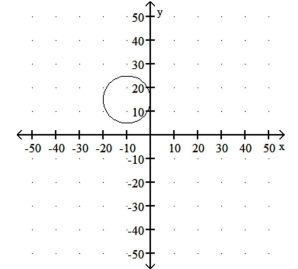
A)
B)
C)
D)

A)
B)
C)
D)

Unlock Deck
Unlock for access to all 189 flashcards in this deck.
Unlock Deck
k this deck
69
Determine whether the pair of lines is parallel, perpendicular, or neither.
6x+2 y=8
18 x+6 y=28
A) Parallel
B) Perpendicular
C) Neither
6x+2 y=8
18 x+6 y=28
A) Parallel
B) Perpendicular
C) Neither

Unlock Deck
Unlock for access to all 189 flashcards in this deck.
Unlock Deck
k this deck
70
Evaluate as requested.
Given that find g(5+h) .
A)
B)
C)
D)
Given that find g(5+h) .
A)
B)
C)
D)

Unlock Deck
Unlock for access to all 189 flashcards in this deck.
Unlock Deck
k this deck
71
Solve the problem.
Roberto invested some money at 8%, and then invested $3000 more than twice this amount at 11%. His total annual income from the two investments was $4830. How much was invested at 11%?
A)$30,000
B)$9000
C)$3300
D)$33,000
Roberto invested some money at 8%, and then invested $3000 more than twice this amount at 11%. His total annual income from the two investments was $4830. How much was invested at 11%?
A)$30,000
B)$9000
C)$3300
D)$33,000

Unlock Deck
Unlock for access to all 189 flashcards in this deck.
Unlock Deck
k this deck
72
Solve the problem.
On a recent trip, Sarah's car traveled 20 mph faster on the first 120 miles than it did on the remaining 80 miles. The total time for the trip was 4 hr. Find the speed of Sarah's car on the first part of the trip.
A)10 mph
B)60 mph
C)35 mph
D)40 mph
On a recent trip, Sarah's car traveled 20 mph faster on the first 120 miles than it did on the remaining 80 miles. The total time for the trip was 4 hr. Find the speed of Sarah's car on the first part of the trip.
A)10 mph
B)60 mph
C)35 mph
D)40 mph

Unlock Deck
Unlock for access to all 189 flashcards in this deck.
Unlock Deck
k this deck
73
Find the slope and the y-intercept of the line with the given equation.
A)
B)
C) -1 ;(0,1)
D) 1 ;(0,1)
A)
B)
C) -1 ;(0,1)
D) 1 ;(0,1)

Unlock Deck
Unlock for access to all 189 flashcards in this deck.
Unlock Deck
k this deck
74
Write a slope-intercept equation for a line with the given characteristics.
m = 0; passes through (7, 5)
A)x = 5
B)x = 7
C)y = 5
D)y = 7
m = 0; passes through (7, 5)
A)x = 5
B)x = 7
C)y = 5
D)y = 7

Unlock Deck
Unlock for access to all 189 flashcards in this deck.
Unlock Deck
k this deck
75
Determine the slope, if it exists, of the graph of the given linear equation.
A) m=
B) m=0
C) not defined
D) m=
A) m=
B) m=0
C) not defined
D) m=

Unlock Deck
Unlock for access to all 189 flashcards in this deck.
Unlock Deck
k this deck
76
Answer the question.
The points (-2,3),(1,6),(3,-2) , and (6,1) are the vertices of a quadrilateral. Is the quadrilateral a rectangle?
A) Yes
B) No
The points (-2,3),(1,6),(3,-2) , and (6,1) are the vertices of a quadrilateral. Is the quadrilateral a rectangle?
A) Yes
B) No

Unlock Deck
Unlock for access to all 189 flashcards in this deck.
Unlock Deck
k this deck
77
Find an equation for the circle.
Center at (5, 0), radius 6A)
B)
C)
D)
Center at (5, 0), radius 6A)
B)
C)
D)

Unlock Deck
Unlock for access to all 189 flashcards in this deck.
Unlock Deck
k this deck
78
Find the zero of the linear function.
f(x)=4-9 x
A)
B)
C)
D)
f(x)=4-9 x
A)
B)
C)
D)

Unlock Deck
Unlock for access to all 189 flashcards in this deck.
Unlock Deck
k this deck
79
Solve the problem.
Water accounts for 60% of a man's weight. Stan weighs 174 lb. How much of his body weight is water?
A)87 lb
B)174 lb
C)104 lb
D)139 lb
Water accounts for 60% of a man's weight. Stan weighs 174 lb. How much of his body weight is water?
A)87 lb
B)174 lb
C)104 lb
D)139 lb

Unlock Deck
Unlock for access to all 189 flashcards in this deck.
Unlock Deck
k this deck
80
Determine whether a linear model might fit the data.
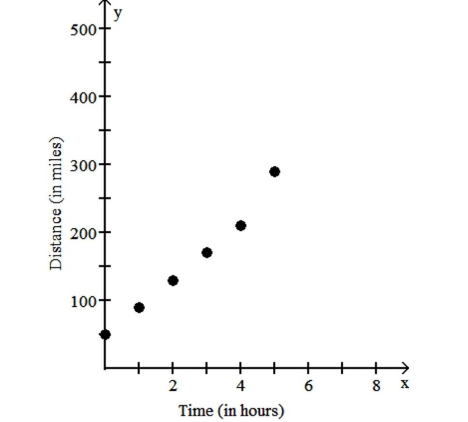
A) Yes
B) No

A) Yes
B) No

Unlock Deck
Unlock for access to all 189 flashcards in this deck.
Unlock Deck
k this deck



